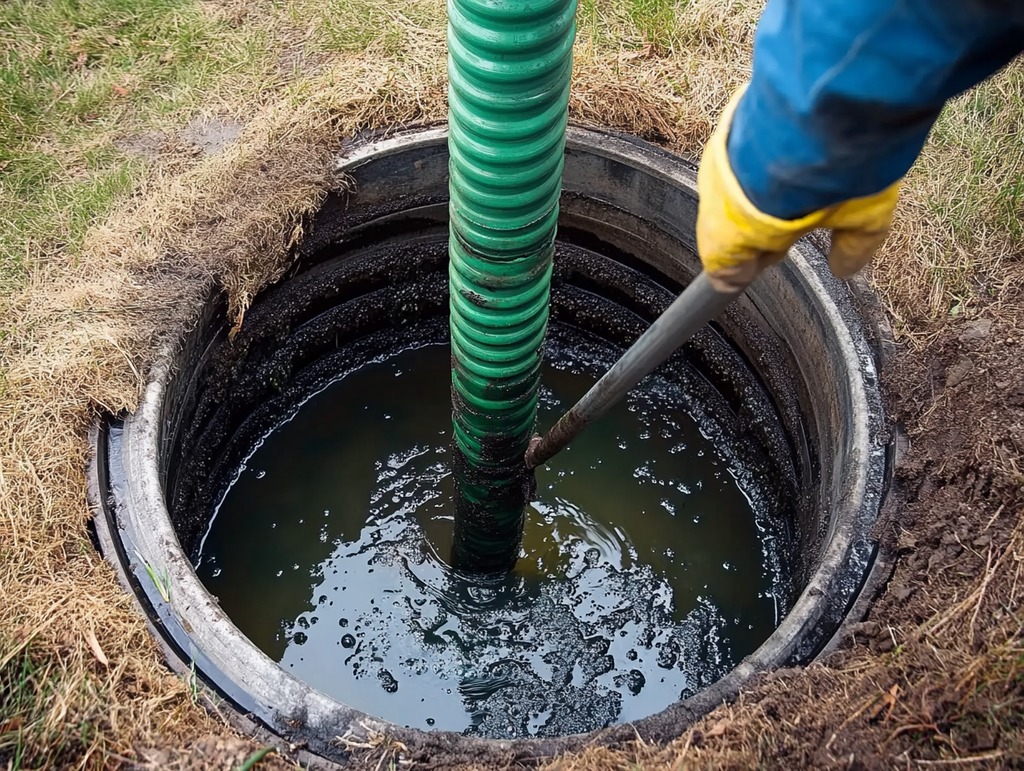When it comes to the real estate market, the number of bedrooms in a home is a crucial selling point. Whether you’re buying, selling, or just evaluating your property, the bedroom count significantly influences your home’s value and appeal. In North Carolina, a typical bedroom is greater than 100 square-feet, has a ceiling height greater than 7’, includes 1 window, and has a closet. However, for homes with a septic system, there’s a critical but often overlooked factor that limits how many bedrooms you can legally claim: the septic permit.
Understanding the Septic System and Permit Basics
A septic system is an underground wastewater treatment structure commonly used in rural areas without centralized sewer systems. It processes everything that goes down the drains—sinks, showers, toilets, and laundry. The system includes a septic tank, which holds the wastewater long enough for solids to settle to the bottom, and a drain field, where the remaining liquid (effluent) is released into the soil.
A septic permit is issued by your local health department or environmental agency and is based on the size of your septic system and the soil’s ability to absorb water. The permit outlines the specifications of your system, including its capacity, which is measured in gallons per day. This capacity determines how many people—or more specifically, how many bedrooms—your system can support.
Why Bedrooms Matter in Septic Permits
The number of bedrooms in a home is directly related to the amount of wastewater the household is expected to generate. More bedrooms generally mean more people, which translates to more water usage. Local health departments use the number of bedrooms as a way to estimate the potential load on the septic system.
When you apply for a septic permit, you’re required to specify how many bedrooms your home has or will have. The health department then calculates whether your septic system is adequately sized to handle the wastewater from that number of bedrooms. If the system is deemed too small, you may have to install a larger system, reduce the number of bedrooms, or explore other solutions.
How Septic Permits Limit Bedroom Count
Once the septic permit is issued, it becomes a legal limitation on how many bedrooms you can claim. If you try to list or market your home as having more bedrooms than your septic system is permitted for, you could face legal consequences, fines, or be forced to downgrade your listing.
This limitation has a few critical implications:
- Home Valuation: The value of your home is often tied to the number of bedrooms. If your septic permit limits you to fewer bedrooms than you physically have, it can reduce your home’s market value.
- Renovations and Additions: Thinking about adding another bedroom to increase your home’s value? You’ll need to check your septic permit first. You might have to upgrade your septic system before proceeding, which can be a significant expense.
- Selling Your Home: When selling, disclosing the correct number of bedrooms is crucial. Misrepresenting this could not only deter potential buyers but also lead to legal trouble if the new owners find out your home doesn’t comply with the septic permit.
What Happens If You Exceed Your Septic System’s Capacity?
If you ignore the septic permit and go ahead with using or marketing more bedrooms than allowed, several issues can arise:
- System Overload: A septic system designed for a three-bedroom house may struggle to handle the waste generated by a five-bedroom home. Overloading the system can lead to backups, failures, and costly repairs.
- Health Hazards: A failing septic system can pose serious health risks. It can cause sewage to back up into your home or contaminate local water sources, leading to environmental and health concerns.
- Legal and Financial Repercussions: Beyond the risk to your home and health, exceeding your septic permit can lead to fines and legal action. You could be required to reduce the number of bedrooms or upgrade your septic system, both of which can be expensive.
Steps to Take If You’re Considering Home Modifications
If you’re planning to modify your home—whether adding bedrooms or converting other spaces like offices or basements into bedrooms—consider the following steps:
- Review Your Septic Permit: Before making any changes, check your existing septic permit to see how many bedrooms your system is approved for. If you don’t have a copy, you can request it from the county you live in.
- Consult with Professionals: Speak with a septic system professional or a local health department official. They can assess whether your current system can handle additional bedrooms or if you’ll need to upgrade.
- Upgrade If Necessary: If your system needs an upgrade, it’s essential to complete this before making any other modifications. This may involve installing a larger septic tank or expanding the drain field.
- Amend Your Septic Permit: If you make any changes to your system or home, you may need to apply for an amended septic permit to reflect the new number of bedrooms.
Common Misconceptions About Septic Permits and Bedrooms
- It’s Just a Technicality: Some homeowners think they can get away with claiming extra bedrooms because it’s just a “technical” issue. However, this misunderstanding can lead to significant problems down the line, both legally and financially.
- Basements and Bonus Rooms Don’t Count: You might think that because a room doesn’t have a closet or is located in the basement, it doesn’t need to be counted as a bedroom. However, if it’s used as a sleeping space, it must be factored into your septic capacity.
- Upgrading Septic Systems Is Optional: If your current system isn’t adequate, you must upgrade it before adding bedrooms. Ignoring this requirement can cause system failures and legal issues.
FAQs
1. Can I add a bedroom without upgrading my septic system?
Possibly, but only if your current system is already sized for more bedrooms than you currently have. Otherwise, you’ll likely need an upgrade.
2. How do I know how many bedrooms my septic system can support?
Check your septic permit or consult with your local health department. The number should be clearly stated in your permit documentation.
3. What happens if I sell my home with more bedrooms than the septic permit allows?
You could face legal consequences, including fines, and might be required to compensate the buyer for any issues arising from the misrepresentation.
4. Is it expensive to upgrade a septic system?
Upgrades can be costly, depending on the size of the system and the complexity of the installation. It’s best to get a professional estimate.
5. Can I just not tell the buyer about the septic permit?
No. Full disclosure is required by law. Failing to disclose this information can lead to legal action and complications in the sale.
Wrapping Up
The number of bedrooms in your home is more than just a figure for listing purposes; it’s a critical component that’s tied directly to the functionality and legal standing of your septic system. Understanding the connection between your septic permit and the number of bedrooms you can claim is essential for maintaining your home’s value, avoiding legal trouble, and ensuring the health and safety of your household.
When in doubt, always consult with professionals to ensure your home is compliant with local regulations and that your septic system can handle your needs.





